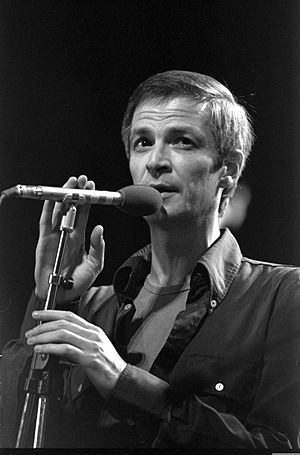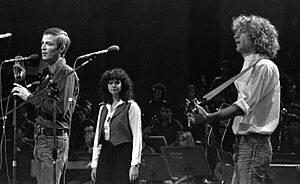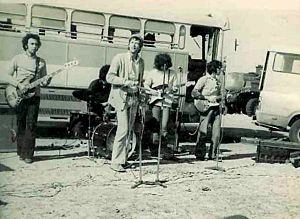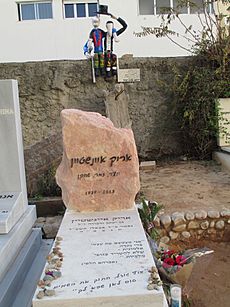Arik Einstein facts for kids
Quick facts for kids
Arik Einstein
|
|
|---|---|

Arik Einstein, 1979
|
|
| Background information | |
| Born | 3 January 1939 Tel Aviv, Israel |
| Died | 26 November 2013 (aged 74) Tel Aviv-Yafo, Israel |
| Genres | Rock, Israeli rock |
| Years active | 1957–2013 |
| Labels | Israphone Helicon Hed Artzi Hagar-Phonokol BNE CBS Phonokol NMC HaTaklit Haifa Media Direct HaTav HaShmini |
| Associated acts | Batzal Yarok Yarkon Bridge Trio The High Windows Shalom Hanoch The Churchills Peter Roth |
Arieh Lieb "Arik" Einstein (Hebrew: אָרִיק אַייְנְשְׁטֵייְן, pronounced [ˈaʁik ˈainʃtein]) was a famous Israeli singer, actor, comedian, and writer. He was born on January 3, 1939, and passed away on November 26, 2013. Many people called him "the voice of Israel." He helped create Israeli rock music and is seen as one of Israel's most important and popular artists ever.
Arik Einstein had an amazing music career that lasted over 50 years. He recorded more than 500 songs and released or worked on 34 albums. This is more than any other Israeli musician! He often worked with other famous Israeli singers and writers like Shalom Hanoch and Miki Gavrielov. Einstein also wrote many of his own songs. He sang in bands like The Churchills, Batzal Yarok, and The High Windows.
Contents
Early Life and Sports
Arik Einstein grew up in Tel Aviv, Israel. He was the only child of Ya'akov and Dvora Einstein. His father, Ya'akov, was an actor.
When he was young, Arik was a great athlete. He was Israel's junior champion in high jump and shot put. He also played basketball for Hapoel Tel Aviv B.C.. His father encouraged him to try out for the army entertainment group, and he was accepted.
Music Career Highlights
Starting with the Army Band
Before joining the army, Arik wanted to be a military fitness instructor. But because he had poor eyesight, his father told him to try out for the army band instead. He joined the famous Nahal Brigade army band. This band helped many talented Israeli musicians start their careers.
Even though Arik was shy, his special voice was quickly noticed. He soon began singing solo songs, like "Ruach Stav" ("Autumn Wind").
Becoming Famous
After leaving the army in 1959, Einstein joined the Batzal Yarok (Green Onion band). He also performed in the Sambation theatre. In 1960, he released his first solo album. He also sang in the Yarkon Bridge Trio.
In 1964, he acted in the comedy movie Sallah Shabbati. He starred alongside Chaim Topol, who was also from the Green Onion band.
The High Windows Band
In 1966, Einstein formed a band called The High Windows with Shmulik Kraus and Josie Katz. Their first album came out in April 1967. It was a new sound for Israeli rock and pop music. The album was very popular, even in parts of Europe like France.
Arik left the group after one year because he disagreed with Kraus. He felt it was hard to make music for a European audience if they couldn't understand the deep meaning of the Hebrew lyrics. He believed the Hebrew language was a key part of his music. Even so, Einstein and Kraus stayed good friends and worked together again later.
Solo Music Years
Two years later, Einstein released an album called Mazal Gdi (Capricorn), but it wasn't very successful. So, he looked for a new sound. He then made the album Puzi with The Churchills. Many people see this as the first Israeli rock album.
He kept releasing albums throughout the 1970s and 1980s. He often worked with other top artists like Shalom Hanoch and Miki Gavrielov. Many of these albums are still seen as amazing works in Israeli rock and pop music today.
Einstein stopped performing live concerts in the early 1980s. He said he was too shy to perform in front of big crowds. He felt much more comfortable singing in a recording studio. He was a very humble musician who focused on the art of music, not on being famous.
"The Old and Good Land of Israel" Albums
In 1973, Einstein started singing older Hebrew songs. These songs were mostly written in the first half of the 20th century. He released a series of albums called "The Old and Good Land of Israel." These albums included many different styles of songs, from old homeland songs to "Ballroom" songs from the 1950s. He used modern music styles with musicians like Shem-Tov Levi. He said he sang these songs simply because he loved them.
Music in the 1990s and 2000s
In 2004, Einstein released Shtei Gitarot Bas Tupim (Two Guitars, Bass, Drums). He also sang a duet with David D'Or on D'Or's CD in 2006. In 2010, Einstein's songs were played the most on Israeli radio stations. In 2011, he released a new song to celebrate the return of an Israeli soldier, Gilad Shalit.
Acting Career
Einstein was one of the stars in the famous film Sallah Shabati. This movie is considered the start of popular Israeli cinema. It showed Eastern Jews meeting modern Israeli society. Einstein played the boyfriend of the main character's daughter.
The "Lool Gang" TV Show
In the early 1970s, Einstein was part of a TV show called Lool (Chicken Coop). It was a comedy and song show with a group known as the "Lool Gang." Lool featured songs by famous Hebrew poets, sung by some of Israel's best singers, including Einstein and Shmulik Kraus.
The show was very creative. Uri Zohar, a brilliant comedian and actor, was a key part of the group and Einstein's close friend. Even though Lool only had four episodes, it is still a very popular show today. Many of its comedy skits are seen as timeless Israeli classics. The show proved that Einstein was both a top singer and a great comedian.
In May 1970, a film called "Shablool" ("Snail") was released. It was a continuation of "Lool," with sketches and songs. These songs became a joint album by Einstein and Shalom Hanoch, also called "Snail." This album is considered one of the most important albums in Israeli rock music.
Why He Was So Loved
Many important people praised Arik Einstein. Benjamin Netanyahu, who was Prime Minister, said that Einstein was "the beautiful and charming Israel that we all grew up to adore."
A famous music critic, Yoav Kutner, said that Arik Einstein was "more than the greatest Israeli artist of all time. Einstein is the real Israel himself." People admired his humble nature and how he avoided showing off.
His Passing
Arik Einstein passed away on November 26, 2013, at the age of 74. He collapsed at home and was taken to the hospital. News channels in Israel reported on his condition for hours.
When he died, Prime Minister Benjamin Netanyahu said his songs were the "soundtrack of Israel." President Shimon Peres said his voice "came from the depths" and his songs would "continue playing life and hope."
Israel's main radio station, Galgalatz, played his songs for 48 hours straight. He was buried in Trumpeldor Cemetery in Tel Aviv. Before the funeral, his body was placed in Rabin Square, where thousands of people came to say goodbye.
Tens of thousands of people attended his funeral, including the Prime Minister and many other artists and musicians. His close friend, Uri Zohar, led the burial.
On October 7, 2014, 40,000 people gathered for a concert to honor him. Many of his old friends and collaborators performed.
Personal Life
In 1963, Arik Einstein married Alona Shochat. They had a daughter named Shiri. They divorced after four years but remarried a year later. Their second daughter, Yasmin, was born in 1971. They divorced again in 1972. Alona Einstein passed away in 2006.
Arik Einstein's second wife was Sima Eliyahu. They met while filming the movie Metzitzim in 1972. They had a daughter, Dina, and a son, Amir.
Even though he was a successful actor and singer, Einstein thought of himself as shy and someone who preferred to stay home. He once sang that his greatest joy was being home with a cup of lemon tea and his books. He stopped giving public concerts after 1981 because he found it hard to perform for large crowds.
In 1982, he was hurt in a major car accident, and his wife was also injured. After the accident, his eyesight got worse, and he spent even less time in public.
Einstein also loved sports and knew a lot about them. He was a big fan of the Hapoel Tel Aviv sports club, especially the soccer and basketball teams. He even played for Hapoel Tel Aviv when he was younger. Some of his songs mention his love for sports and for his favorite teams.
Discography
Studio albums
- 1966 – Shar bishvileh (Singing for you)
- 1968 – Mazal Gdi (Capricorn)
- 1968 – Yashan Vegam Hadash (Old and also New)
- 1969 – Puzi
- 1970 – Shablul (Snail)
- 1970 – Plastelina (Plasticine)
- 1971 – Shirey Yeladim (Kids' Songs)
- 1971 – Badeshe etzel Avigdor (At Avigdor's on the Grass)
- 1972 – Yasmin (Jasmine)
- 1973 – Hashanim Harishonot (The First Years)
- 1973 – Eretz Yisrael Hayeshana veHatova (Good Old Land of Israel)
- 1974 – Sa leat (Drive slowly)
- 1975 – Shirim (Songs)
- 1976 – Eretz Yisrael Hayeshana veHatova bet (Good Old Land of Israel part 2)
- 1976 – Yeladim (Kids)
- 1976 – Haahava panim rabot la (Love Has Many Faces)
- 1977 – Eretz Yisrael Hayeshana veHatova Gimel (Good Old Land of Israel part 3)
- 1978 – Leket (Medley)
- 1978 – Yeladudes (Kiddos)
- 1980 – Eretz Yisrael Hayeshana veHatova-Meshirey Sasha Argov (Good Old Land of Israel-Sasha Argov's Songs)
- 1980 – Hamush Bemishkafaim (Armed With Glasses)
- 1981 – Leket Leyladim (Collection for Kids)
- 1982 – Yoshev Al Hagader (Sitting on the Fence)
- 1983 – Shavir (Fragile)
- 1984 – Pesek Zman (Time Out)
- 1984 – Nostalgia-Eretz Yisrael Hayeshana veHatova (Nostalgia-Good Old Land of Israel)
- 1985 – Totzeret Haaretz (Made in Israel)
- 1986 – Ohev Lihiyot Babait (Love Being Home)
- 1987 – Al Gvul Haor (On the Boundary of Light)
- 1988 – Meshirey Avraham Halfi (Avraham Halfi's Songs)
- 1989 – Hashanim Harishonot (The First Years)
- 1989 – Haiti Paam Yeled (I was a Boy Once)
- 1992 – Nostalgia-Eretz Yisrael Hayeshana veHatova (Nostalgia-Good Old Land of Israel)
- 1992 – Haarye, Hayona, veTarnegolet Kchula (The Lion, The Dove, and a Blue Chicken)
- 1995 – Yesh bi Ahava (Got Love in Me)
- 1996 – Ktzat lakahat Hazara (Take Back a Little)
- 1997 – Lean Parchu Haparparim (Where Have the Butterflies Gone)
- 1999 – Muscat
- 2002 – Shemesh Retuva (Wet Sun)
- 2004 – Shtei Gitarot, Bass, Tupim (Two Guitars, Bass, Drums)
- 2006 – Rega'im (Moments)
- 2007 – Kol HaTov Shebaolam (All the Good Things in the World)
See also
 In Spanish: Arik Einstein para niños
In Spanish: Arik Einstein para niños
 | William M. Jackson |
 | Juan E. Gilbert |
 | Neil deGrasse Tyson |




